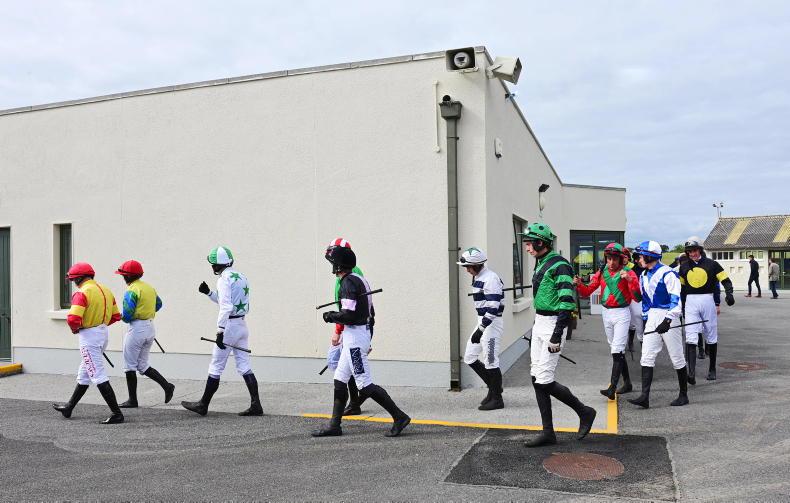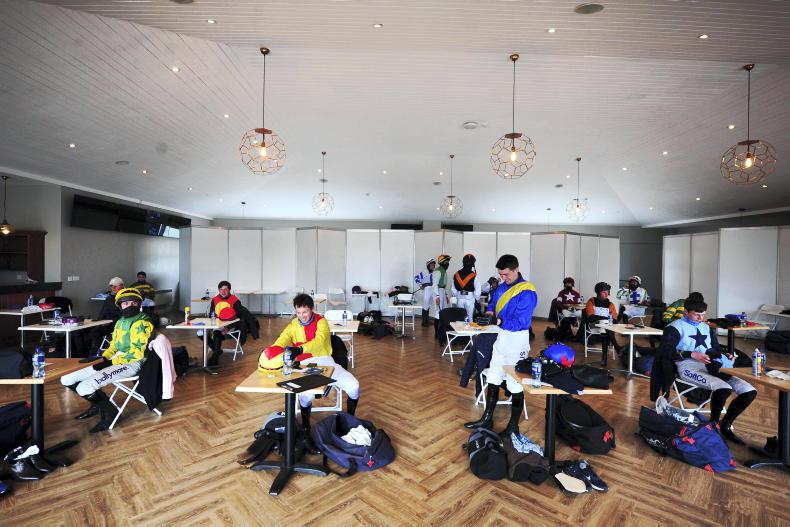THE chief executive of the Irish Horseracing Regulatory Body - formerly the Turf Club – says that the continuing decrease in licensed trainers is worrying. Latest official figures show that there were 578 licences issued in 2017, down from a high 10 years ago of 805.
Denis Egan also expressed disappointment over an increase in the number of whip rule breaches in the past year and said that the penalty guidelines for jockeys may have to be reviewed “as the current penalties are not having the desired effect.”
The statistics cover stewards’ enquiries, appeals and referrals hearings, drug/alcohol testing of riders, drug testing of horses, licences, non-runners, medical statistics, handicap ratings and off-times.
The key statistics are as follows:
i) Stewards Enquiries
· Number of penalties for breaches of:
- Vaccinations not in order up 63% to 140
- Whip rules up 29% to 169
- Starting rules down 88% to 6
- Weighing in/out rules up 65% to 71
ii) Appeals and Referrals Hearings
· 31 appeals were determined with 35% being successful or partially successful
· 44 referrals were heard
iii) Drug/Alcohol Testing of Riders
· 244 riders were drug tested with four riders returning positives tests (Cocaine metabolites)
iv) Drug Testing of Horses
· 4,094 samples were tested with 5 tests being positive
· 407 out-of-competition samples were tested
v) Licences
· Trend of annual falls in the number of National Hunt riders’ licences issued is reversed with
120 licences issued (up 19%)
· 309 Qualified Riders' permits issued (down 8%)
· 93 National Hunt trainers’ licences issued (down 10.5%)
· 137 National Hunt restricted trainers’ licences issued (down 13%)
vi) Medical Statistics
· The injury rate per ride in both flat and National Hunt racing fell to 0.10% and 0.99%
respectively
vii) Handicap Ratings
· Number of hurdlers rated 130 or higher down 19% to 118
· Number of chasers rated 130 or higher up 4.5% to 190
In relation to the stewards’ enquiry figures, Egan said the big increase in the breaches of the vaccination rules was due to all passports being checked on racedays. In previous years only passports that met certain criteria were checked.
The decrease in the number of starting rule breaches is as a result of greater discipline at the start, following the introduction of a recording system.
He said the increase in weighing in/out enquiries is due to new rules on overweights which were introduced.
With regard to the key licensing statistics, Egan said: “It is pleasing to see that the recent trend of falling National Hunt riders’ licences has been reversed. However, the fall in National Hunt trainers’ licences for both full and restricted licences is very worrying with double digit percentage falls being recorded in both categories.”
He said that the number of National Hunt trainers’ licences is now at its lowest level in many years. “This is an area that will have to be addressed,” he said. He noted that the situation is not getting any better and referred in particular to the difficulty there is currently in filling the trainers’ course which means that less trainers are entering the profession.
Commenting on the medical statistics, Dr Adrian McGoldrick, senior IHRB medical officer, said the improvement in the injury rates may be attributed to the introduction of the new Level 2 safety vest in January 2017. He noted that the number of visceral injury rates had reduced significantly. Concussion rates for jump racing had remained stable but there was an increase in the concussion rate for flat racing. Dr McGoldrick noted that only nine of the 38 falls in flat racing actually occurred during the race.
On Tuesday afternoon, the Irish Jockeys Association's executive secretary Andrew Coonan commented: "On the face of it, the increase in the number of whip enquiries is not significantly different from the 2015 statistics, but possibly reflects a more stringent approach being taken by the Regulatory Body.
"While it was disappointing that we had four positive drug cases in 2017, the number of such positive cases is very much in line with the figures from 2013 to 2016 and, while concern had been raised in certain quarters that a problem might exist in the weigh room, the statistics certainly do not bear this out.
"More encouraging was the fact that there were over 750 alcohol tests for riders with no positives.
"I would be concerned, however, that the number of successful appeals against penalties imposed by the local stewards has significantly dropped from a high of 61% in 2015 to 35% in 2017. One thing that could be concluded from this is that the Appeals Body is tending to uphold local stewards’ decisions to the detriment of appellants.
"The increase in issued [jump jockeys'] licences is an unusual trend, compared to the falling numbers among trainers and, indeed, the number of licences granted to flat jockeys has, in fact, decreased.
"There is no obvious reason for the increase of National Hunt licences but we have seen a few cases of riders taking out professional licenses and relinquishing these within a short period of time and reverting to qualified riders’ [amateur] status."
MORE INDUSTRY REACTION TO THIS STORY IN THE IRISH FIELD NEXT WEEKEND


 This is a subscriber-only article
This is a subscriber-only article
 It looks like you're browsing in private mode
It looks like you're browsing in private mode










SHARING OPTIONS: